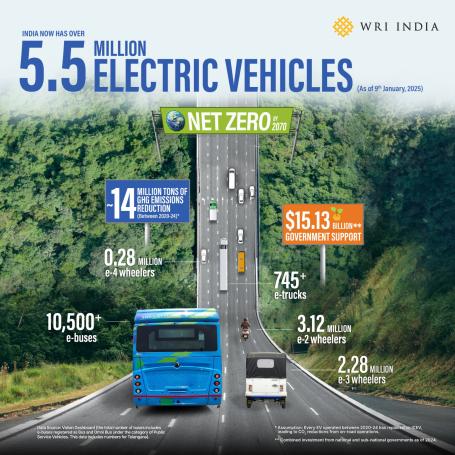
Accelerating Electric Mobility for a Low-Carbon Future
Increasing access to electric vehicles and charging infrastructure while optimizing to minimize emissions.
The transport sector contributes 13.5% of India’s energy-related emissions, with road transport alone accounting for 87%. As India advances toward its net-zero goal for 2070, electric mobility emerges as a critical pathway for decarbonizing the transport sector, strengthening energy security, and fostering economic resilience.
India’s transition to electric mobility has gained remarkable momentum. EV sales grew from just 0.7% of total motor vehicle sales in 2020 to 6.3% in 2024. In January 2025, India reached a significant milestone, surpassing 5.5 million EVs on road.

WRI India has been working at the national, subnational, and local levels to support the ongoing EV transition by providing technical assistance, capacity building, and evidence-based research for informed policymaking and implementation.
Our Focus Areas
Policy Support and Road Mapping: We support government bodies at all levels in formulating policies, roadmaps, and strategies for region-specific, data-driven EV adoption. Some of our recent work includes providing technical inputs in devising the PM eBus Sewa Scheme, PM e-DRIVE scheme and supporting the Bharat Zero Emission Trucking (ZET) Policy Advisory. We are also working with the Ministry of Heavy Industries as part of its national taskforce to prepare a roadmap for the accelerated adoption of electric cars, buses and freight. We also assist in implementing local EV policies and integrating charging infrastructure into building byelaws, electricity tariffs, and permit exemptions.
Driving Collaborative and Inclusive Action: To ensure the transition to EVs is equitable and inclusive, we foster multi-stakeholder partnerships that bridge technology, knowledge, skilling, and financing gaps. For example, we serve as the secretariat for NITI Aayog’s e-FAST platform, a first-of-its-kind platform that brings together industry leaders, policymakers, and researchers to co-create sustainable freight solutions. Recently, we also initiated the Battery360 Alliance – a multi-stakeholder platform to amplify India’s efforts towards a sustainable, circular and resource-efficient ecosystem for batteries.
Expanding Sustainable Urban Mobility: We are committed to accelerating the electrification of urban transport by promoting the widespread adoption of electric two- and three-wheelers (e-2Ws and e-3Ws) for shared and last-mile mobility. Our inclusive approach ensures that low-income and marginalized communities benefit from cleaner, more accessible transportation options.
Addressing Critical Knowledge Gaps: We meet the evolving EV landscape’s need for continuous capacity-building and knowledge-sharing through research, training materials and toolkits.
Some key resources:
- Handbook for Electric Vehicle Charging Infrastructure Implementation: We co-authored this handbook to provide a systematic approach for implementing authorities and stakeholders, guiding them through the planning, authorization, and execution of EV charging infrastructure.
- Financial Analysis of Charging station (FACt) Tool: We developed a unique Excel-based tool that helps in analyzing the financial performance of an investment in Public Charging Station (PCS) deployment.
- TCO EValuator: This evaluator analyzes key cost components and performance parameters across all fuel types and transport modes to assess their impact on the total cost of ownership (TCO) per kilometer.
- ‘Rolling Out Electric Buses’: This guidebook helps public and private transit agencies adopt a calibrated approach to induct e-buses in their public bus services.
- Bharat ZET Policy Advisory: Launched by the Office of the Principal Scientific Adviser, Government of India, this advisory outlines 30 strategic interventions across incentives, regulations, infrastructure, financing, and business models to accelerate freight electrification.
- Workplace Electric Vehicle Charging Guidebook for Corporates in Delhi: Co-developed this step-by-step guide to help corporates assess the potential for workplace charging, outlining key processes for informed decision-making and effective implementation of EV charging stations.
Enabling the Shift to Electric Auto-rickshaws: A Guidebook for Electrification of Auto-rickshaw Fleets in Indian Cities: Co-developed by NIUA and WRI India as a capacity-building resource for all sub-national stakeholders looking to undertake ambitious action on passenger auto-rickshaw electrification.
More Related
Accelerating Electric Mobility for a Low-Carbon Future is a part of Sustainable Cities program.
Contact Ankita Rajeshwari for media inquiries.
Powering the EV Shift: Building India’s Charging Ecosystem
Part of Sustainable Cities
Accelerating India's Freight Decarbonization
Driving the adoption of Zero-Emission Trucks (ZETs) through collaboration, policy innovation, and scalable pilot solutions
Part of Sustainable Cities
Enabling an Equitable EV Transition for MSMEs in Maharashtra
Part of Sustainable Cities
Developing a Circular and Sustainable Battery Value Chain in India
Part of Sustainable Cities
Reimagining India's Public Transport With Scale-up of Electric Buses
Part of Sustainable Cities






